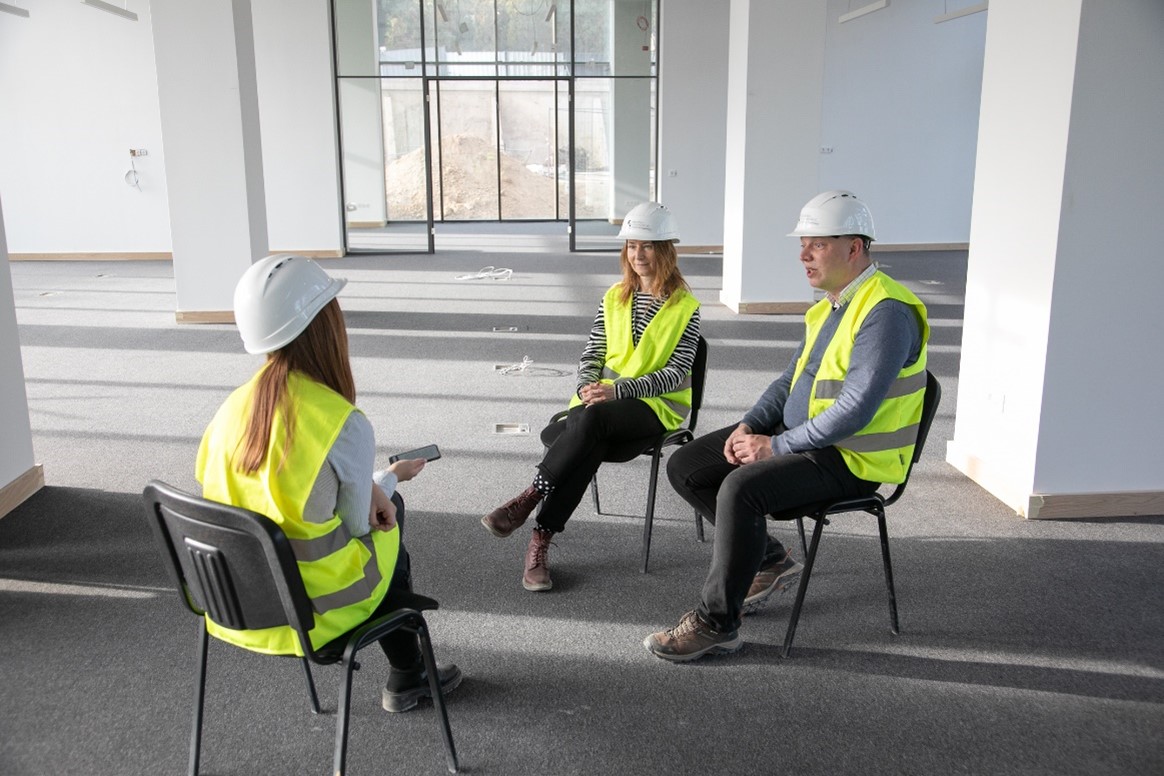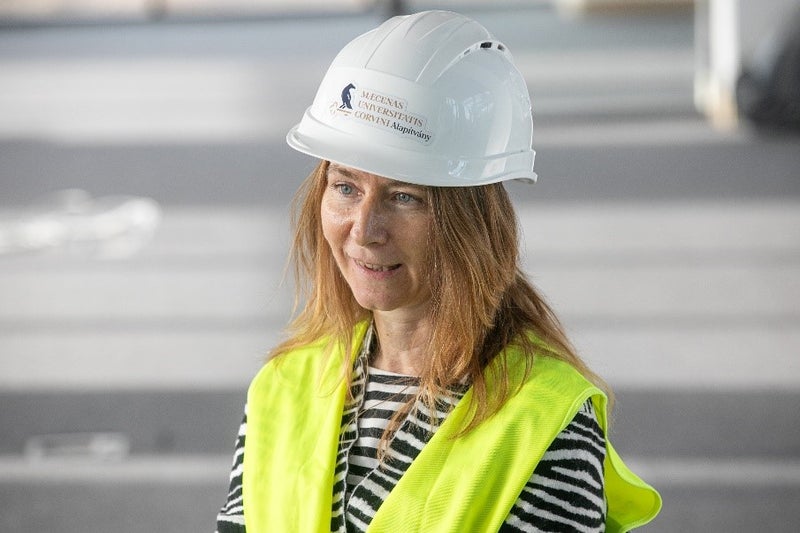“The traditional teaching role will most certainly be transformed” – this is how teaching will take place on the new campus

All three of us were surprised when entering the Data Space at the Ménesi Road Campus a basically finished room unfolded before us. There is no furniture yet, but the huge open space and the surrounding glass surface already create a futuristic effect. The space is divided by four columns, but even these will have their benefits in terms of teaching methodology.
“Some colleagues, if they are made to stand in a space, they stay there. And they love it. And there is the restless colleague who can’t stay still. And this building has its own characteristics, these are the five-by-five grids. We couldn’t get rid of the columns because they hold the building up, so some spaces have two columns in the middle. There, if you stand still, you can’t teach well. But this forces the lecturer to not being separated from the students, but to being among them, and it’s collaborative work or collaborative thinking,” says Péter Fehér, who is currently the university’s international director, but was the Dean of Executive Programmes when the campus was designed, and a member of the Institute for Data Analytics and Information Systems.
“As a lecturer and a teacher using design methods, I started to get a picture of how we could dream up this space in a way that would also be well suited to alternative teaching methods,” says Dóra Horváth, Associate Professor at the Institute of Marketing and Communication Sciences, Head of the Department of Marketing and Design Communications and member of the Design Business Society, aka the de.bu.so Lab.
They both look back on the planning process with a smile and fond memories. Péter Fehér points out that they were lucky to have been given so much time to plan. He says it’s rare for any project that they can explore all the aspects. He says that they didn’t try to plan from behind a desk, but that the members of the development project visited the future new campus several times, and also toured the space with Dóra to imagine and test how they would like to and how it would be possible to teach there.
The design thinking methodology played an important role in the design, but not in the usual way, says Dóra Horváth. “The planning process was carried out together with experts who played a key role in the development of the MOME campus, we went through all the steps of the methodology. At the same time, it was very exciting for me to see a very creative community come together, who were very involved in the space, and by breaking with the classic steps, the process ended up taking a separate path, and the team was much more creative than the original plans,” she recalls the design.

Being a university student again
For both of them, flexibility was the most important aspect in the design of their educational spaces. Their aim was to create a flexible space that could be shaped by how the dialogue and design process evolved. The advantage of easily rearranged spaces is that, unlike in the past, the lecturer does not have to leave much earlier and stay much longer to rearrange the benches if he or she wants to hold a group session. Some spaces will only be separated from the corridor by a curtain, so they are still somewhat part of the corridor, but they are still educational spaces where knowledge is not confined within four walls.
Community was the other buzzword in the design of the spaces.
“It’s very important that students can be students here again because it’s so nice to be here, to be able to give 100 per cent to what they do. And they don’t have to think about going to work. Which is fair enough, it’s just a sore point for me that they have to work instead of enjoying their freedom as young adults,”
says Dóra Horváth about the community-building role of the campus. In her view, uncomfortable spaces, poor lighting and the routine of the main building are also barriers to students being able to live a truly communal life.
“Break with traditional education”
“Let’s forget what we have done so far and try to look to the future, both in education and in research” – according to Péter Fehér, educational trends do not point in the traditional, Prussian direction. On the contrary, he believes that co-creation is the future between lecturer and student, student and student, and that the campus spaces are conducive to this.
“The traditional teaching role is definitely changing. So it’s not that I stand up on the podium and you have to listen to me, because I’m a genius, but we also encourage the students to think together, and let them argue with me, let them argue with each other.”
Péter Fehér adds that they would like to implement the good practices devised during the experimentation in the other buildings as well.

“As a university start-up, this is where bold, new things start, which then trickle back into the more conservative environment,” says Dóra Horváth. She believes that there should be peer cooperation between students and teachers: co-teaching and co-consulting. She also thinks that education moves in the direction of discussions on a specific topic, for which the garden will be an excellent venue, for example, where a full-fledged class can be held in a relaxed format, as electricity and internet are available.
Where the labour market goes to the student
According to Dóra Horváth, the Makerspace will also be a useful space where students can experience what it means to connect with designers, to solve a problem as a designer, and it will absolutely change the way they think about their profession. The end point of all this could be when they can not only design a service system, but also create an object, for example.
“We are sitting here in the Data Experience Lab, which is another special space. You could say that you shouldn’t even come together, because everyone can analyse data wherever they want. But precisely because data analytics and artificial intelligence will become increasingly important in the future, we wanted a dedicated space that could be a community-building, mutually supportive space. In some cases, I can also imagine that we analyse data here, come up with results, and then have a physical manifestation of that”, says Péter Fehér.
They want to create spaces where the labour market can find the student, so there is room for companies. This way, the student does not have to go to work to gain work experience.
The university’s start-up incubator is also planned to be located here. Thanks to the programme, ideas here can become not only reality, but also business.
Dóra Daróczi